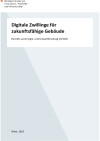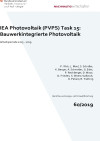Suchergebnisse für "Factsheet%3A Energietechnologien gestalten%2C die f%C3%BCr alle sinnvoll und nutzbar sind"
Ausstellung: Baufamilien-Tag
31. Jan 2010
Sonnenplatz Großschönau
3922, Großschönau, AT
Der Sonnenplatz Großschönau veranstaltet am 31. Jänner 2010 erneut einen Baufamilien Tag. Dieses Mal zum Schwerpunktthema "Photovoltaik/Solaranlagen".
Digitale Zwillinge für zukunftsfähige Gebäude

Digitale Gebäudezwillinge werden bislang aufgrund eines oft ungünstigen Verhältnisses von Aufwand zu Nutzen kaum in der Praxis eingesetzt. Ziel des Projekts TWIN war es, Anwendungsfälle digitaler Gebäudezwillinge mit hoher ökologischer und ökonomischer Wirkung zusammenzuführen, um darauf aufbauend Anwendungsszenarien mit großem Umsetzungspotential aufzubereiten.
Schriftenreihe
50/2025
Michael Fuchs, Michael Monsberger, Martin Krammer, Moritz Amberger, Gerhard Zucker, Konrad Diwold, Lukas Krammer, Michael Krisper, Alfred Waschl
Herausgeber: BMIMI
Deutsch, 90 Seiten
Downloads zur Publikation
Biopolymers and Beyond - Regenerative Kohlenstoffquellen als Perspektive für zukunftsfähige Kunststoffe
1. - 2. April 2025
The Stage, 1220 Wien
Erfahren Sie mehr über innovative Ansätze der Defossilisierung von Kunststoffen, um den Kohlenstoffbedarf von primären fossilen Ressourcen zu entkoppeln.
Info-Veranstaltung: Baufamilientag zum Schwerpunktthema "Wohnraumlüftung"
27. Sep 2009
Sonnenplatz Großschönau
Großschönau, AT
Der Sonnenplatz Großschönau veranstaltet am 27. September 2009 erneut einen Baufamilien Tag. Dieses Mal zum Schwerpunktthema "Wohnraumlüftung".
Technologie Portrait Thermische Solarenergie (Juni 2000)

Das Technologie Portrait bietet einem Fachpublikum ebenso wie der interessierten Öffentlichkeit ein kompaktes Querschnittsbild des Technologiebereiches Thermische Solarenergie.
Passivhaus: Zukünftiger Standard oder Modeerscheinung?
30. Jan 2008
Julius-Raab-Saal, Wirtschaftskammer OÖ, Hessenplatz 3
4020 Linz, AT
Qualitätssicherung im Holzbau - Schwerpunkt Passivhäuser
Neue Fördermöglichkeiten für marktfähige Fabrik der Zukunft Entwicklungen
Das klima:aktiv Programm "nawaro markt" unterstützt Unternehmen bei der Umsetzung von konkreten Investitionsvorhaben zur stofflichen Nutzung nachwachsender Rohstoffe.
Natural Dyes for the Textile Industry
New cooperations between agriculture und industry are necessary to ensure the utilization of renewable materials. The project´s focus is upon natural dyes and their application in textile industry. The goal of the project is to create a contact institution which connects various suppliers of diverse plant materials, takes on the processing, and standardising of the natural dyes, and makes a product that can be used by the industry.
Info-Veranstaltung: "Grund-Strohballen-Legung" S-House
26. Mar 2003
BÖZAT - Böheimkirchen Zentrum für Angepasste Technologie, 3071 Böheimkirchen, Obere Hauptstraße 2Böheimkirchen, AT
Veranstaltung zur Programmlinie "Haus der Zukunft"
Gründerzeit with future - subproject 6: dissemination
Dissemination aimed at defining the relevant target groups and broadly distributing the innovative solutions of the flagship project GdZ to the defined target groups. It is of crucial importance to effect a wide awareness level and to make a deep impact on the relevant target groups.
Ausstellung: Baufamilien-Tag
28. März 2010
Sonnenplatz Großschönau
Großschönau, AT
Baufamilien-Tag zum Schwerpunktthema "Sanierung mit Passivhaus-Komponenten"
Joint Call: "Integrated Regional Energy Systems" im Rahmen von ERA-Net Smart Energy Systems
ERA-Net Smart Energy Systems (SES) startet den ersten Joint Call "Integrated Regional Energy Systems" für RDI Projekte (Ausschreibungsvolumen etwa 30 Mio Euro).
Wood Plastic Composites - Development of an extrusion tool
Development of a new generation extrusion tool for a wood plastic composite. This material will be developed in a second project an should show a fiber content of 60 - 85%. Important is a high profile quality as well as a high output to ensure an economical production.
Workshop: ECODESIGN radikal
1. Juli 2008
Pöttinger Entsorgungstechnik, Industriestraße 30
4710 Grieskirchen, AT
Innovationen durch ökointelligente Produkte
IEA HPP Annex 32: Heating and Cooling for Low Energy Houses
20. November 2007, 14:00 - 16:30 Uhr
TU Graz - Hörsaal i6, Inffeldgasse 25/D, Graz
IEA Photovoltaik (PVPS) Task 15: Bauwerkintegrierte Photovoltaik

Bauwerksintegrierte Photovoltaik (BIPV) ist eines der Zukunftsfelder in der Photovoltaik, welches Energietechnik und Architektur zu einem Element zusammenführt. Das Projekt fokussierte sich auf zusätzliche nationale Forschung im Bereich der BIPV, um neue Geschäftsfelder zu identifizieren oder Ansätze zur internationalen BIPV Standardisierung zu entwickeln.
Schriftenreihe
60/2019
P. Illich, L. Maul, S. Schidler, K. Berger, A. Schneider, G. Eder, P. Rechberger, D. Moor, D. Frieden, S. Woess-Gallasch, G. Peharz, R. Trattnig
Herausgeber: BMVIT
Mehrsprachig, 75 Seiten
Downloads zur Publikation
IEA Wind Task 32: Webinar Summary - Approaches in filtering data from pulsed wind lidar (2020)

Zusammenfassung des Webinars "Filtering lidar data" vom 7. April 2020.
Alcayaga L., Floors R., and Santos P., ed. Clifton, A.
Herausgeber: IEA Wind
Englisch, 3 Seiten
IEA Bioenergie Task 42 - Nationales Stakeholder Vernetzungstreffen
15. Januar 2020
Festsaal BOKU, Gregor-Mendel-Straße 33, 1180 Wien, AT
Beim nationalen Vernetzungstreffen der Bioraffinerie-AkteurInnen in Österreich wurde unter anderem das neue COMET K1 Competence Center CHASE (Chemical Systems Engineering) vorgestellt.
Fachtagung: Wege zur klimaneutralen Kommune
30. September 2012
Landesmesse StuttgartStuttgart, DE
Fachtagung im Rahmen der CEP® CLEAN ENERGY & PASSIVEHOUSE
Kongress: e-nova 2011
24. - 25. November 2011
Campus Pinkafeld, Steinamangerstraße 21
7423 Pinkafeld, AT
Nachhaltige Gebäude - Innovative Technologien & Konzepte für Gebäude der Zukunft
